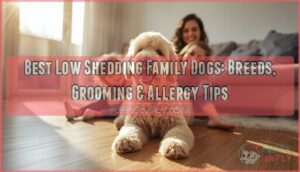This site is supported by our readers. We may earn a commission, at no cost to you, if you purchase through links.

Now, seek a furry friend who matches your slower pace.
Specific breeds embrace the gentle rhythm of later years.
Investigate:
- Petite pups with lower exercise needs thriving in small spaces
- Larger loyal companions content to share quiet moments
Consider:
- Grooming requirements
- Training expectations
The right senior dog enriches golden years with unconditional affection.
Research breeds like the trusty Beagle before inviting a new member into your family.
Table Of Contents
Key Takeaways
- Consider a small dog breed like the Maltese or Havanese if looking for an affectionate, moderately active lap dog requiring daily grooming and with a lifespan over 12 years.
- Medium dog breeds like the Cavalier King Charles Spaniel or Bichon Frise can be playful, moderately easy to train, and require regular grooming with a lifespan of 12-15 years.
- Large breeds like the Greyhound can be gentle and mellow, need moderate exercise, require minimal grooming, and have a lifespan of 10-12 years.
- Best apartment dogs like French Bulldogs and Pugs are low energy, moderately easy to groom, affectionate and lazy with lifespans of 10-15 years.
Choosing the Right Dog
When selecting a canine companion, you must first realistically assess your physical abilities and limitations. Once you understand what you can and cannot handle, carefully research breed characteristics to find those best matching your lifestyle. For specific recommendations tailored to your unique situation, consult reputable breeders or your veterinarian. ### Consider Physical Abilities
You should consider your own physical abilities and limitations when choosing a dog breed as a senior. Selecting a breed that matches your activity level and doesn’t require intense exercise prevents frustration for both you and the dog. Prioritize adaptability and easy grooming needs over specific aesthetic preferences. Seek breeds with fewer health issues so you can provide the care your aging companion needs. When aligned with your lifestyle, even small pups make wonderfully devoted friends in your golden years. ### Research Breed Characteristics
After considering your physical abilities, you’ll want to thoroughly research a breed’s likely characteristics before choosing the right dog for you. Look into breed traits like: – Affection level
- Trainability
- Grooming needs
- Exercise requirements
- Health issues
Prioritize senior-friendly attributes like: – Moderate energy
- Ease of care and training
- Minimal grooming needs
- Breeds prone to fewer health problems
An affectionate, easygoing breed that fits your lifestyle will make the best companion. ## Best Small Dogs
If you’re considering a small dog breed, two top choices are the Maltese and the Havanese. The Maltese thrives on being a constant companion and enjoys sitting in your lap or going for short walks. The Havanese is a bit more energetic but very trainable and adaptable. Both breeds have the advantage of being small enough to easily lift and carry, a plus for many seniors. ### Maltese
One breed you should consider if looking for a small dog is the Maltese. This quintessential little white lap dog enjoys spending time in their owner’s lap and going on short walks. As a happy, intelligent small breed, Maltese thrive indoors, are hypoallergenic, generally easy to train, and require daily brushing and regular professional grooming to prevent matting of their long, silky coat. Their moderate activity needs make them a nice fit for many seniors. ### Havanese
In tandem with the Maltese, the Havanese makes for one of the best small dogs for seniors. You’re getting an affectionate and adaptable pup that thrives in small spaces. Despite their playful temperament, Havanese training is fairly easy. Their energetic yet small size makes them a great companion for active seniors without demanding too much exercise. Their long coat does require regular grooming to prevent matting. ## Best Medium Dogs
Next, let’s look at some medium-sized breeds that can make great companions for seniors. The playful Cavalier King Charles Spaniel and the cheerful Bichon Frise are two examples of friendly, loving mid-sized dogs that enjoy human interaction while requiring only moderate activity levels. Both breeds bond strongly with their families while adjusting well to apartment living, making them suitable options for older adults seeking a mid-sized canine buddy. ### Cavalier King Charles Spaniel
Two. You’re looking at an affectionate, adaptable breed that’s easy for you to handle and train when considering the Cavalier King Charles Spaniel. This medium-sized dog is known for its loving nature and ability to adapt well to different environments. With their long, silky coats, they do require regular grooming but are relatively low-maintenance in terms of exercise needs. However, it’s important to note that Cavaliers can be prone to certain health conditions such as heart disease and syringomyelia, so proper healthcare should be a priority. ### Bichon Frise
Top Companion Dogs for Older Adults: Two. Your bubbly Bichon Frise makes an excellent medium-sized companion for seniors seeking a playful pooch that enjoys snuggling. While requiring moderate grooming and training to nurture their affectionate yet mischievous temperament, their hypoallergenic coat and cheerful demeanor enhance compatibility, despite periodic health issues. ## Best Large Dogs
You’ve moved onto larger breeds after looking at some mid-sized options. Consider a pooch like the mellow Greyhound that matches a more relaxed pace yet still enjoys getting regular moderate exercise with short daily walks and occasional light running. As a veterinarian and certified dog trainer who cares for the elderly, I always advise clients to carefully weigh a large breed’s long-term exercise needs and potential health issues before bringing one home. Seek out gentle giants known for moderately energetic yet senior-friendly traits. When visiting shelters and breeders to find the right fit, don’t shy away from mature pooches. Adopting an adult can sidestep destructive puppy behaviors while still gaining a loving companion. Overall, select the affectionate giant that energizes your golden years without overexerting your lifestyle. ## Best Apartment Dogs
When living in an apartment, consider a small or medium breed that doesn’t require a lot of space. The French Bulldog and Pug are great apartment companions – they’re low energy, low maintenance, and love to cuddle. Just be aware that these brachycephalic (short-nosed) breeds can develop breathing issues and require air conditioning. ### Pug
Among the best apartment dogs for seniors is the Pug, with its snorting snores, wrinkled mug, and agreeable laziness nestled contentedly in your lap. Despite their small size, Pugs have big personalities and can be very playful and entertaining. Regular bathing and wrinkle cleaning is required to prevent infections. Monitor Pugs closely for signs of breathing issues, obesity, arthritis, and dental problems. ### French Bulldog
Weighing between 16-28 pounds, the amiable French Bulldog thrives in confined city spaces. Their moderate exercise needs and affectionate nature make them an ideal apartment companion. Food-motivated and preferring snacks to exercise, they require several hours of quality bonding time each day to nurture their snuggly personality. As low-maintenance apartment dwellers, their minimal grooming needs make them a hypoallergenic choice for seniors seeking a ## Best Low Maintenance
When considering a canine companion, many older adults prioritize a breed that’s low maintenance. The Shih Tzu and Pembroke Welsh Corgi are two examples of small dogs that tend to require less exercise and grooming than other breeds. These pint-sized pups make excellent senior pets that are easier to care for. ### Shih Tzu
Your affectionate and adaptable Shih Tzu will bond closely with you while requiring minimal grooming and exercise. This kid-friendly breed enjoys cuddling in laps thanks to their small size. Their long, silky coats necessitate regular brushing and trimming to prevent mats. Shih Tzus adapt well to apartment living and smaller spaces. Despite their diminutive stature, they make excellent watchdogs. With minimal barking, this trusting companion gets along with most people, especially children. ### Pembroke Welsh Corgi
The Pembroke Welsh Corgi makes an excellent choice for seniors needing a lower maintenance companion. This small breed is an adaptable senior companion that helps keep the house clean and doesn’t bark much. Their characteristics include: – Minimal grooming requirements
- Routine exercise needs
- Loyal and affectionate nature
Best Companion Dogs
Having considered the best low-maintenance dogs, your best companion dogs include the Yorkshire Terrier and Cavalier King Charles Spaniel. These breeds are excellent choices for seniors who desire a loyal and affectionate companion to share their golden years with. The Yorkshire Terrier is a small breed that doesn’t require much space but provides ample love and devotion. They’re known for their intelligence and adaptability, making them easy to train. On the other hand, the Cavalier King Charles Spaniel is gentle-natured and great with people of all ages, including grandkids. They have moderate exercise needs which can be easily met by daily walks or playtime in a secure backyard. Both breeds have minimal grooming requirements compared to others, ensuring that you can enjoy quality time together without spending excessive time on upkeep. ## Best Guard Dogs
Pomeranians and Miniature Schnauzers can make excellent watchdogs. They will alert you to anything suspicious, without being overly aggressive or high-maintenance. Their small size means they’re easy to handle and won’t knock you over. However, they have big personalities and will let you know if a stranger approaches. Consider their tendency to bark as a feature when looking for a dog that provides a sense of security. ### Pomeranian
For older adults seeking a tiny guard dog, consider getting a feisty yet affectionate Pomeranian. This energetic small breed makes excellent watchdogs. They bark at strangers but quickly bond with their owners. Poms need daily brushing and occasional bathing. Their exercise needs are easily met with short walks or playtime. Despite their small size, Pomeranians have big personalities perfect for providing companionship to seniors. ### Miniature Schnauzer
You can also consider the Miniature Schnauzer as one of the best guard dogs for seniors. – Energetic and playful, but compact in size.
- Minimal shedding and grooming needs.
- Alert, intelligent, and eager to please.
- Longer lifespan of 12-14 years.
- Prone to health issues like diabetes and pancreatitis.
Best With Grandkids
You’ll want a breed that’s gentle, playful, and tolerant of children if you have young grandkids visiting often. Both beagles and golden retrievers tend to be patient, kid-friendly dogs that enjoy playing. These breeds also typically have an easygoing temperament that makes them a great fit around rambunctious little ones. ### Beagle
With a loving, patient, happy-go-lucky personality, a beagle makes a great companion for seniors with visiting grandkids. Beagles are playful, energetic dogs that get along wonderfully with respectful children. However, beagles require regular exercise and training to curb their natural instincts to follow scents. Keep treats handy for positive reinforcement during training to curb wandering or howling. Daily exercise meets their needs for sniffing and exploring. With proper socialization, beagles become devoted, gentle companions for seniors hoping to connect with grandkids. ### Golden Retriever
- Your active Golden Retriever will lovingly bond with grandkids through backyard play sessions and brisk walks.
Their mellow nature and patience make them ideal companions for youngsters. These dogs have steady temperaments and will put up with tails pulled and feet stepped on. Training and socialization early on set the rules for respectable interactions. Regular grooming keeps their thick coats mat-free and tidy. Provide them daily exercise to curb mischief and meet their energetic requirements. With proper care, Goldens enjoy a 10-12 year life expectancy. ## Settling In
You’ll want to start training your new dog right away to reinforce good behaviors. Make arrangements with family, friends, or professionals in case you need someone to walk your dog or watch them for a short time. Having a plan for your dog’s care in an emergency will give you peace of mind while you both get used to your new life together. ### Training
Before settling into your new routine with your dog, it’s essential that you get it properly trained for good behavior. – Housebreaking
- Basic commands (sit, stay)
- Leash training
- Socialization
Implementing positive reinforcement training techniques early on will prevent future behavioral challenges. Consistent rewards for good behavior help dogs learn faster. Don’t hesitate to enlist a professional trainer for specialized obedience and socialization strategies. ### Care Arrangements
When you’re bringing your new dog home, it’s important to make arrangements for their care in case you have an emergency. Consider identifying a family member, friend, or professional pet sitter who can care for your dog if you end up hospitalized. Having a plan in place will give you peace of mind that your pup will be looked after if you can’t be there.
| Action | Tips |
|---|---|
| Emergency Contacts | Share vet info, feeding schedule, medications |
| Training | Use positive reinforcement, be patient |
| Bonding | Take walks, play games, give treats |
| Grooming | Brush regularly, trim nails, clean ears |
| Health | Annual checkups, watch for changes |
Frequently Asked Questions (FAQs)
What dog breeds tend to have the longest lifespans? This may help seniors choose a dog that they can care for longer.
Yorkshire Terriers and Chihuahuas tend to have the longest lifespans, living 13-20 years on average. Consider their typically small size and lower activity needs when choosing your companion. Still, research breeds thoroughly and talk with your vet before deciding. ### How much space do typical senior dog breeds need indoors and outdoors? Knowing indoor/outdoor space requirements can help determine if a breed will fit one’s home and lifestyle.
When considering space needs, small dogs like Shih Tzus, Pugs, or French Bulldogs thrive with less room than larger breeds. Most senior-friendly small breeds only require short indoor walks and access to a small yard or dog park for daily exercise. Focus more on quality interaction time over quantity of space. ### How expensive is ongoing veterinary care for common senior dog breeds? Understanding associated healthcare costs will allow for proper financial planning.
The costs vary depending on the breed. Regular vet visits for checkups, vaccinations, preventatives like heartworm and flea/tick meds typically run a few hundred dollars yearly. Senior dogs often need extra diagnostics and medications too. Budgeting $500-1000 annually for medical care is reasonable. ### Are there any dog breeds well-suited for seniors with limited mobility? Identifying breeds appropriate for those with mobility issues can improve quality of life for both owner and dog.
Consider a smaller breed like a Havanese or Shih Tzu that enjoys curling up beside you. Their moderate exercise needs and trainability make them well-suited companions if getting around poses challenges. Focus on bonding through gentle play and cuddles rather than long walks. The right dog can be a loving friend. ### What should I do to prepare my home before bringing home a senior dog? Learning about necessary preparations ahead of time, like puppy-proofing, will ensure a smooth transition.
Prepare for your new senior dog by: – Removing trip hazards.
- Installing ramps.
- Keeping essentials easily reachable.
- Acquiring dog beds for level surfaces.
- Installing baby gates for fragile areas.
- Setting routines to promote adjustment and easy transition.
Focus on: – Safety.
- Comfort.
- Building trusting relationships through patience and care.
Conclusion
Ultimately, the perfect senior companion dog depends on your unique needs and lifestyle. As you narrow your search, spend ample time interacting with breeds under consideration—no amount of research replaces firsthand experience. If a dog’s affectionate nature and moderate activity level call to you, welcoming them into your golden years can profoundly enrich this precious stage of life.








